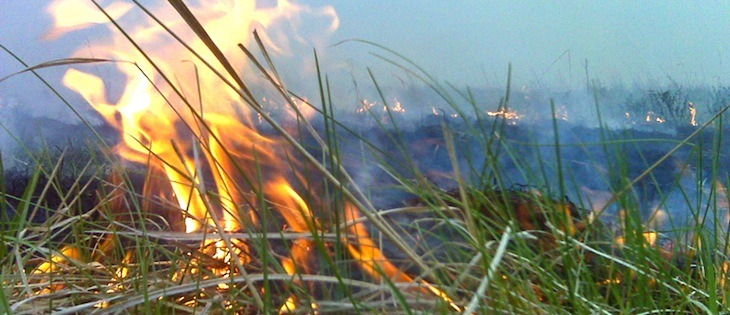Officials hope voluntary rules to curb row crop field smoke will avoid legislative action
by February 14, 2018 6:14 pm 435 views

Smoke generated from farmers burning fields after a harvest has been a controversial topic the last several years in Northeast Arkansas. Arkansas Agriculture Secretary Wes Ward is hopeful the problem can be resolved without new regulations.
Ward told Talk Business & Politics a set of non-binding guidelines will be introduced next week, and will be posted to the Arkansas Department of Agriculture web site.
Ward spoke Wednesday (Feb. 14) at Arkansas State University’s annual Agribusiness Conference held on the ASU-Jonesboro campus. It’s been a difficult issue to navigate, but has also given his department a chance to educate residents about agriculture practices and impacts, he said.
The guidelines are not mandatory, but he’s hopeful the farming community will use them to ease the amount of smoke that fills the skies each fall. Field burning is a vital tool for farmers, and is needed, he said. But, health and other lifestyle concerns by residents in cities such as Jonesboro must be addressed, too, he said.
“It’s voluntary. It’s not a regulation,” he said.
The Arkansas Rice Federation, the Arkansas Department of Agriculture, doctors concerned about the health impacts of the smoke and others formed a task force to study the issue last November. Ward met with one doctor who had concerns and planned to push for legislation to regulate field burning. Ward asked if they could formulate a plan of action that wouldn’t involve legislation.
“One of the most pressing challenges faced by agriculture is regulation,” he said.
The state has 19 million forest acres, and controlled burns are necessary to keep forest lands healthy, he said. A dispatch center operated by the Arkansas Department of Agriculture is used by those in the forest industry to conduct controlled burns, Ward said. The center provides wind, temperature, humidity, and other information that can factor into a burn. If conditions are not favorable, or if too many are burning in one area, the center might suggest a burn should wait, he said.
A farmer could use the system the same way, he said. For instance, if a farmer near Jonesboro calls in and the winds are blowing into residential areas of the city, the dispatch center could tell the farmer it might be better to wait until conditions are more favorable, he said.
Farmers often use drip torches to begin controlled fires in fields after the harvest. Hundreds of thousands of acres are burned in the Delta region each year. A lot of organic refuse is left after the harvest, and it needs to be removed to prepare fields for the next growing season, rice agronomist Dr. Jarrod Hardke said. The refuse can also provide shelter for nuisance weeds and insects that can be detrimental to future crops. Fires can eliminate potential diseases, according to the University of Arkansas System Division of Agriculture.
“There is a need to burn crop residue as a means of pest management,” he said. “In addition, hard-to-control weed species can be eliminated by burning residue. This practice is another tool in the toolbox for growers to effectively manage their farms.”
Burning is used by rice, wheat, soybean and corn growers. Rice growers use it the most, with about 25% of Arkansas rice fields being burned. Fire isn’t always necessary, but it’s especially helpful in rice to manage problematic residue. Waiting on the residue to decay during winter can be a gamble. Winter conditions can slow breakdown and result in increased tillage and delayed planting, resulting in increased production costs and lower yields in some cases. In fields that cannot rotate to crops other than rice, excessive remaining residue in the field can be detrimental to future rice crops.
“Rice residue can be slow to break down,” Hardke said. “To prepare the field for the next season, it can be very beneficial to remove residue by burning, because tillage alone is not always sufficient to remove it for fall field preparation.”
Ward’s department will be able to track the number of calls, but success might be a matter of opinion. If enough farmers buy into the concept, and people think the smoke conditions have improved this fall, they may be able to avoid a legislative battle.
“A lot of it will be public perception,” he said.
